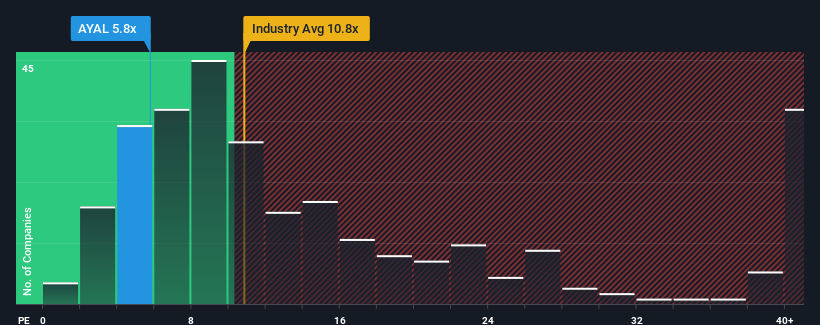Ayalon Insurance Company Ltd (TLV:AYAL) Doing What It Can To Lift Shares

With a price-to-earnings (or "P/E") ratio of 5.8x Ayalon Insurance Company Ltd (TLV:AYAL) may be sending very bullish signals at the moment, given that almost half of all companies in Israel have P/E ratios greater than 13x and even P/E's higher than 19x are not unusual. However, the P/E might be quite low for a reason and it requires further investigation to determine if it's justified.
As an illustration, earnings have deteriorated at Ayalon Insurance over the last year, which is not ideal at all. It might be that many expect the disappointing earnings performance to continue or accelerate, which has repressed the P/E. However, if this doesn't eventuate then existing shareholders may be feeling optimistic about the future direction of the share price.
See our latest analysis for Ayalon Insurance

Is There Any Growth For Ayalon Insurance?
There's an inherent assumption that a company should far underperform the market for P/E ratios like Ayalon Insurance's to be considered reasonable.
Retrospectively, the last year delivered a frustrating 48% decrease to the company's bottom line. Even so, admirably EPS has lifted 78% in aggregate from three years ago, notwithstanding the last 12 months. So we can start by confirming that the company has generally done a very good job of growing earnings over that time, even though it had some hiccups along the way.
This is in contrast to the rest of the market, which is expected to grow by 13% over the next year, materially lower than the company's recent medium-term annualised growth rates.
With this information, we find it odd that Ayalon Insurance is trading at a P/E lower than the market. It looks like most investors are not convinced the company can maintain its recent growth rates.
The Key Takeaway
Using the price-to-earnings ratio alone to determine if you should sell your stock isn't sensible, however it can be a practical guide to the company's future prospects.
We've established that Ayalon Insurance currently trades on a much lower than expected P/E since its recent three-year growth is higher than the wider market forecast. There could be some major unobserved threats to earnings preventing the P/E ratio from matching this positive performance. It appears many are indeed anticipating earnings instability, because the persistence of these recent medium-term conditions would normally provide a boost to the share price.
You always need to take note of risks, for example - Ayalon Insurance has 2 warning signs we think you should be aware of.
It's important to make sure you look for a great company, not just the first idea you come across. So take a peek at this free list of interesting companies with strong recent earnings growth (and a low P/E).
If you're looking to trade Ayalon Insurance, open an account with the lowest-cost platform trusted by professionals, Interactive Brokers.
With clients in over 200 countries and territories, and access to 160 markets, IBKR lets you trade stocks, options, futures, forex, bonds and funds from a single integrated account.
Enjoy no hidden fees, no account minimums, and FX conversion rates as low as 0.03%, far better than what most brokers offer.
Sponsored ContentNew: Manage All Your Stock Portfolios in One Place
We've created the ultimate portfolio companion for stock investors, and it's free.
• Connect an unlimited number of Portfolios and see your total in one currency
• Be alerted to new Warning Signs or Risks via email or mobile
• Track the Fair Value of your stocks
Have feedback on this article? Concerned about the content? Get in touch with us directly. Alternatively, email editorial-team (at) simplywallst.com.
This article by Simply Wall St is general in nature. We provide commentary based on historical data and analyst forecasts only using an unbiased methodology and our articles are not intended to be financial advice. It does not constitute a recommendation to buy or sell any stock, and does not take account of your objectives, or your financial situation. We aim to bring you long-term focused analysis driven by fundamental data. Note that our analysis may not factor in the latest price-sensitive company announcements or qualitative material. Simply Wall St has no position in any stocks mentioned.
About TASE:AYAL
Ayalon Insurance
Through its subsidiaries, provides various insurance products in Israel.
Solid track record with excellent balance sheet and pays a dividend.


